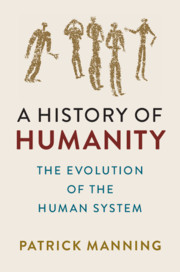Book contents
- A History of Humanity
- A History of Humanity
- Copyright page
- Contents
- Maps, Figures, and Tables
- Preface
- Acknowledgments
- Introduction
- Pleistocene Evolution
- Holocene Evolution
- Anthropocene Evolution
- 9 Systemic Threats
- 10 Hope for Adaptations
- Appendix: Frameworks for Analysis
- Notes
- Glossary
- References
- Index
10 - Hope for Adaptations
from Anthropocene Evolution
Published online by Cambridge University Press: 14 February 2020
- A History of Humanity
- A History of Humanity
- Copyright page
- Contents
- Maps, Figures, and Tables
- Preface
- Acknowledgments
- Introduction
- Pleistocene Evolution
- Holocene Evolution
- Anthropocene Evolution
- 9 Systemic Threats
- 10 Hope for Adaptations
- Appendix: Frameworks for Analysis
- Notes
- Glossary
- References
- Index
Summary
Innovations of the Anthropocene rely on expanded group agency. Popular culture, growing first through literacy, brought successful antislavery campaigns. A spate of twentieth-century media highlighted celebrities, reaching across family and ethnic lines. New knowledge arose at both general and specialized levels. Literacy and the internet have now reached most adults, while specialized knowledge, in disciplines within universities and institutes, confirms human biological equality. Yet results can be contradictory: patents enabled monopolization of knowledge, while open-source computing brought its sharing. The juncture of popular culture with the exchanges of knowledge created a global discourse: indeed, a democratic discourse, in that more and more participated. Topics ranged across the claims of indigenous peoples, the meaning of equality, gender issues, environmental worries, and religious views. Ideologies conflicted, since social priorities and perspectives varied, yet debate continued. This trajectory yields a call for global debate more than for world government – a balance among multiple perspectives rather than delegation to a global elite.
Keywords
- Type
- Chapter
- Information
- A History of HumanityThe Evolution of the Human System, pp. 235 - 256Publisher: Cambridge University PressPrint publication year: 2020

